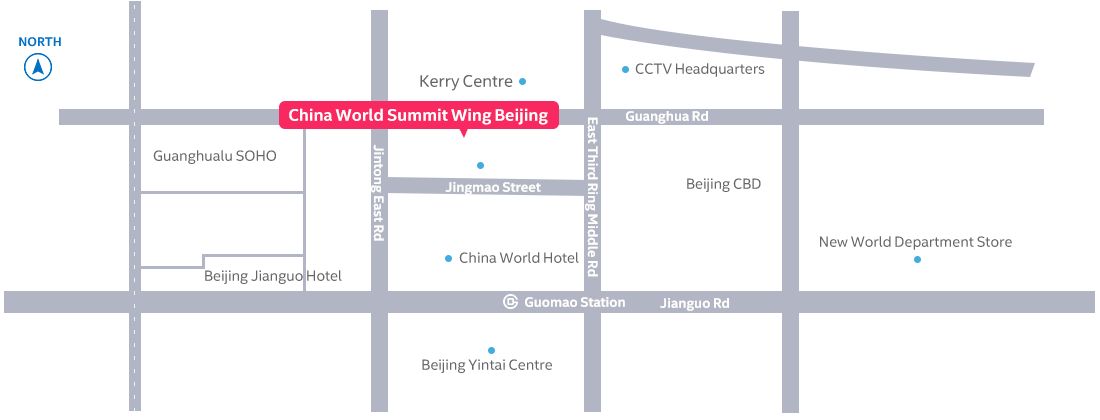Please scan QR code by WeChat and
completed the registration


Dear Valued Guest:
We cordially invite you to attend the Intel® AI DevCon (Intel® AIDC) from November 14-15, 2018 at the China World Summit Wing in Beijing. This world-class AI conference will bring together over 2,000 of the world's most influential AI experts, industry leaders, data architects, and technical engineers. Over 30 industry partners will showcase cutting-edge solutions, products, and technological applications in the AI sector. This conference will focus on technological frontiers, trends, opportunities and challenges related to AI. This will be a wonderful opportunity for you to meet face-to-face with experts in the field and help create the world's top platform for AI partnerships.
- At this summit, you will:
-
- Learn from Intel and leading industry experts on developmental trends and innovative strategies in AI;
- Hear Prof. Zhi-Hua Zhou from Nanjing University, discuss the 'Some Humble Thoughts About Deep Learning' – an alternative approach to deep neural networks;
- Gain deeper insight into how Intel is leading the AI revolution, by delivering hardware that supports AI applications from the edge to the cloud and open source software that speeds AI deployment;
- Experience hands-on demonstrations and implementations of AI on Intel® architecture at hands-on labs;
- Be able to attend over 20 seminars and participate in-depth discussions on regarding AI technology;
- Engage in in-depth discussions about AI technology and topics with over 20 authors of award-winning academic papers;
- Expand your business network and discover potential business opportunities;
At the Intel® AIDC 2018 we will explore cutting edge topics in AI with leading experts in the field, while offering a unique conference experience. We hereby invite you to attend this summit, and hope you will join us in our journey to drive the transformation of industry through AI technology.
Cordially Invited by Intel China
September 2018

-
13:30 - 13:45
- Welcome Address
- Ian Yang, Corporate Vice President, President of Intel China, Intel Corporation
-
13:45 - 15:15
- Breakthrough Theory, AI in Action
- Naveen Rao, Corporate Vice President, General Manager, AI Products Group, Intel Corporation
-
15:15 - 15:45
- Some Humble Thoughts about Deep Learning
- Prof. Zhi-Hua Zhou, Dean of the School of Artificial Intelligence, Head of the Department of Computer Science and Technology, Nanjing University
-
15:45 - 16:15
- The Evolution Path of Artificial Intelligence
- Long Wang, Vice President, Tencent Cloud
-
16:15 - 16:45
- AI in Production: Living in a Data-Centric World
- Jonathan Ballon, Vice President, Internet of Things Group, Intel Corporation
-
16:45 - 18:10
- AI Demo Expo + Networking + Poster Chat
-
09:00 - 09:45
- Revolutionizing AI and Big Data
- Jason Dai, Senior Principal Engineer and CTO of Big Data Technologies, Intel
-
09:45 - 10:15
- AI Research: Physics, Privacy, and the Brain
- Casimir Wierzynski, Head of Research, AI Products Group, Intel Corporation
-
10:15 - 10:45
- The Tools Brought to Life through Data Science
- Yinyin Liu, Head of Data Science, AI Products Group, Intel Corporation
-
10:45 - 11:15
- Large Scale Deep Learning Applications at Baidu and Open-source AI framework PaddlePaddle
- Dianhai Yu, Tech Lead of PaddlePaddle, Chair of Baidu NLP Technical Committee
-
11:15 - 12:00
- Compute in the AI era
- Jiqiang Song, General Manager, Intel Labs China, Intel Corporation
-
12:00 - 13:00
- Lunch + AI Demo Expo + Poster Chat
-
13:00 - 17:30
-
Hands-on Labs + Technical Sessions + AI Demo Expo
- Hands-on Lab Room 1:
-
Theme 1: Reinforcement Learning using RL Coach
Wenzhe Xue, Deep Learning EngineerTheme 2: Use Intel® OpenVINO™ for Object Detection inference and Intel® Vtune™ Ampilifer for performance profiling
Fiona Zhao, Technical Consulting Engineer Hu Yin, Technical Consulting Engineer
- Hands-on Lab Room 2:
-
Theme 1: AI Training and Inference on Intel® Platforms
Chris MA, AI Technical Solutions Engineer Faye Cao, AI Technical Solutions Engineer
Theme 2: Analytics and AI Pipeline introduction, demo and hands-on
Zhichao Li, Senior SW Engineer
-
Hands-on Labs + Technical Sessions + AI Demo Expo
-
13:00 - 17:30
-
Technical Sessions
- Advancing AI Performance Using Intel® Xeon® Scalable Systems
- Neural Network Distiller: A PyTorch Environment for Neural Network Compression
- Intel AI for Good
- The AI Journey With Intel Open Source Software
- Efficient Neural Network Training on Intel Xeon-based Supercomputers
- Efficient Computation for Deep Neural Networks
- Feature Extraction and Bounding-Box Regression: Latest Progresses of Object Detection
- Signal Processing Architectures and VLSI for Energy-Efficient Intelligent Perception System
- Transfer Learning for Speech Model
- Cross-Media Correlation Analysis and Intelligence
- AI Based Video Cloud Best Practice in iQiyi
- Cutting-Edge Research to Enable Deep Learning at the Edge
- Accelerating AI Inference with Intel® OpenVINO™ From Edge to Cloud
- Intel® AI Application in FSI Field
- Intelligent Infrastructure Platform to Accelerate Enterprise AI Deployment
- Analytics Zoo: Analytics and AI Pipeline on Apache Spark and BigDL
- A Tool to Solve AI Commercialization – AutoM
- Tensorflow Optimized For Intel® Xeon™
- Scaling Distributed TensorFlow Training With Intel’s nGraph Library
- Movidius MyriadX Overview and Performance ShowCase -- 3D CNN
- Intel® FPGA For AI
- Understanding New Vector Neural Network Instructions
- IOTG Video Solution Introduction
- Overview of Intel AI Builders Partner Program
- Application of Artificial Intelligence in Medical Image
-
Technical Sessions

- INTEL
- INSPUR GROUP
- CORERAIN TECHNOLOGIES
- HORIZON ROBOTICS
- QINGCIOUD
- TSINGHUA TONGFANG
- UMCLOUD
- JD.COM
- MIDEA GROUP KUKA ROBOTICS CHINA CO.LTD.
- DJI
- SENSCAPE TECHNOLOGIES
- BEIJING VION TECHNOLOGY,INC.
- INTEL AI® BUILDERS:JP TECH
- HUIYING MEDICAL TECHNOLOGY(BEIJING)CO,LTD.
- VISMARTY TECHNOLOGY CO.LTD
- ACCURAD HEALTHCARE NETWORK CO,LTD.XI AN
- 4PARADIGM
- INTEL&ALIBABA CLOUD
- CHINA TELECOM
- BAIDU
- LENOVO
- BEIJING YUNJI TECHNOLOGY CO.,LTD.
- TENCENT YOUTU LAB
- SHENZHEN SIMTOO INTELLIGENT TECHNOLOGY CO.LTD
- INTEL LAB CHINA/WUHAN UNIVERSITY/MAKERCOLLIDER
- INTEL LAB CHINA/WWF/HIKIVISION
-
Intel® Movidius™ Myriad™ X VPU with Neural Compute Engine
Intel® Myriad™ X third generation VPU delivers world class-leading performance in computer vision and deep neural network inferencing.
AI accelerator demo: one or multi-ways video streaming input via USB is inferenced with typical neural network algorithms. Human bodies are detected and identified, the frame rate is about 60 fps.
High performance Smart Camera demo: Camera input to Myriad™ X’s own ISP; through image pre-processing, objects detected by mobileNetSS, object recognized by mobileNet and output NN analysis result to display on PC via USB, the frame rate is about 30 fps.
Smart Traffic Solution with Intel® Movidius™ Myriad™ X Based Vision Accelerator
Intel ® Movidius ™ Myriad ™ X based Vision Accelerator is a product that provides powerful deep neural network inference capabilities for fast and accurate video processing together with Intel OpenVINO ™ toolkit, to meet the needs of edge computer vision applications and help solution providers and their customers take full advantage of video analysis in more practical scenarios .
Enhancing Motorsports with Intel® AI
Ferrari Challenge is a single model race series. Intel® is applying AI to the drone-based race coverage. Solution uses fine grain classification and few shot learning to match each car to its driver.
RL Coach: A Research Framework for Reinforcement Learning
Coach is an open source Python* RL framework for AI agent development and training. It supports many state-of-the-art RL algorithms, integrated with multiple simulation environments.
Vehicle License Plate Detection Using OpenVINO™ and Intel® FPGA
OpenVINO™ is an Intel® FREE toolkit to fast-track high-performance computer vision and deep learning inference to vision applications. In this demo we show OpenVINO™ deep learning application running on Intel® FPGA PAC board (Arria® 10), which uses deep learning for Vehicle and Chinese License Plates Detector, Vehicle Color/Type Recognition and Chinese License Plates Recognition.
Analytics zoo - The Unified Analytics + AI Platform
Introduce the why, what and how of the Unified Big Data Analytics and AI Platform - Analytics Zoo, which is based on Apache Spark and BigDL™. This demo shows example source code of Analytics Zoo to achieve practical demo such as “Soccer Star Recognition”, “Image generation”, etc.
Next Generation Intel® Xeon® Scalable Processor with Intel® DL BOOST
DL Boost is a set of processor technologies designed to accelerate AI deep learning use cases. It extends Intel® AVX-512 with a new Vector Neural Network Instruction.11X speed up in performance delivers a better TCO for customers and a more consistent experience for end users.
Intel® Neural Compute Stick 2
Introducing a New Generation of Versatile, Productive Plug-and-Play AI development kit, powered by the Intel® Movidius™ Myriad™ X VPU.Delivering up to 8X the performance of its predecessor.
High-Content cellular imaging on Intel® Xeon® Scalable Processors
PERFORMANCE IMPROVEMENT OF TRAINING TIME OF M-CNN USING HIGH-CONTENT IMAGING.
-
FPGA-based Acceleration for Real-time Image Classification - Powered by Inspur F10A with Intel® Arria™ 10 FPGA
Supported by Inspur's NF5280M5 AI Server with 4 F10A FPGA cards, this live demo shows FPGA-based acceleration for real-time image classification is enabling high efficiency, low latency, and high performance image recognition with high accuracy. Inspur F10A is equipped with Intel® Arria™ 10 FPGA.
-
Corerain AI Edge Solution Based on Intel® Arria™ 10 FPGA SoC
Corerain AI Edge Solution uses Intel Arria™ 10 FPGA 660 SoC and Corerain self-developed chip structure, CAISA, providing powerful AI real time detection solution, which can support 16 full HD surveillance cameras to detect faces, cars, and traffic situation with the power consumption of 36W.
-
Matrix 360 Degree Vision Perception System Powered by Intel® Arria™ 10 FPGA
Horizon Robotics 360° visual perception system consists of three sets of Matrix that are in-house developed by ourselves. By designing the position of mounted cameras, our computing platform for autonomous driving can achieve a 360-degree perception around the vehicle.
Dense Crowd Human Behavior Analysis Solution Powered by Intel® Arria™ 10 FPGA
XForce is our newly launched FPGA Edge AI computing platform based on Horizon's BPU 2.0 AI Processor architecture. With the hardware deeply customized to seamlessly run our proprietary algorithms, XForce provides superior visual perception capabilities with extraordinary efficiency in cost and power consumption compared with generic GPU solutions. XForce now supports functionalities of human behavior analysis and video structuring.
-
QingCloud Deep Learning Platform based on Intel® Xeon® Scalable Processor
Run deep learning jobs like face recognition, object detection and word vector training using Intel Xeon ®Scalable Processor and Intel Optimized Caffe framework on QingCloud deep learning platform.
-
SighTA - Xeon® Scalable Processor-based Computer Vision Practice for Intelligent Transportation Systems
SIGHTA is a real-time traffic AI analysis product based on video algorithms and computer vision techs. The core features includes traffic data collection, traffic accidents detection, device status evaluation and highway fog detection.
-
Ucloud AI:Inference Online Service Based on Xeon® Scalable Processor
Through UAI platform, we can help customers to achieve AI training tasks and inference services.
-
JD Magic Cam - Powered By Intel® Core® processor
JD Magic Cam, a smart camera developed by China's largest retailer, JD.com that allows people to superimpose their images on different backdrops in real-time, provides a unique marketing solution for offline stores. A real-time mapping function enables users to virtually switch instantly from one scene to the next. Users can add 2D and 3D special effects to each scene, and can seamlessly share images created with JD Magic Cam across social media with friends to aid in purchasing decisions. In addition to providing a source of entertainment for consumers, JD Magic Cam also empowers businesses with enhanced marketing and user engagement capabilities. JD Magic Cam is powered by Intel® i5-6500 processor. expand and upgrade future innovations.
-
AI Based Industrial Vision Inspection Executed on Xeon® & Core®
The whole solution is based on huge volume of image data captured on the factory production line in real time which are later pre-processed & sent cloud (Private or public). In the cloud, the AI engines are trained with the data on Xeon Scalable processors. Finally, the inference engine can be implemented on either the cloud side or the front-end Core® i7, depending on the network condition and the latency requirement, to conduct various kinds of vision inspections.
-
MANIFOLD2 - Core i7+OpenVINO Based Drone Computing Platform
Skysys is the very first team ever in China that is engaged in the development of drones' hangar, aka the Drone Autonomous Operating Platform or the Drone-enabling System. The advent of this particular system, which is named as UltraHive, has offered a one-stop solution that resolves all the drawbacks of current drones, including difficult control, short endurance, lack of hangar and poor universalization.
-
Horned Sungem- Intel® Movidius™ Based AI VISION KIT
Sketch Guess This demo presents a Google mini-game 'Quick, Draw!' clone made using HS and Python There are 350 stages in total. In each stage you will be asked to draw a specific object on the paper The neural network in HS will decide if your drawing matches the object's title.
Face Recognition This demo presents a realtime multi-face detection and recognition system that is built with HS, It runs on most platforms with nearly no extra computational cost on the host The system can also register new faces on the fly
-
Intel® Movidius™ VPU Based SMART RETAIL SOLUTIONS
Tarsier Module by VIONVISION, based on the unparalleled small-sized Movidius™ chip with low power consumption (about 1.5W) but powerful computing power. Smart Cameras based on Tarsier Module:Smart Face People Counting Camera, All-in-one People Counting Camera,Smart Fisheye Camera.
-
Dr. Pecker
Based on the Intel® Xeon® SP Platform, Dr. Pecker greatly improves the efficiency and accuracy of medical imaging diagnosis, and reduces the rate of missed diagnosis and misdiagnosis.
-
AI full-cycle health management platform for Breast Cancer
Intel and HuiyiHuiying jointly developed the‘Artificial Intelligence Breast Cancer Full Cycle Health Management Platform’, which covers the entire process from breast cancer prevention screening to follow-up monitoring, providing a reliable end-to-end artificial intelligence solution to hospitals.
-
AI-assisted Image Contents Detection System with Intel® FPGA Arria™ 10 FPGA
Currently,with introduction of 4G and coming 5G,huge number of image and videos contents are generated continuously in the internet, one major issue of the content-provider is to realize an effective detection to avoid unpermitted contents publicated , We demonstrate an effective AI based image detection using Intel® AIO PAC card for certain content. Combining with Vismarty's own AI algorithm and FPGA implementation, an outperformed processing speed will be demonstrated comparing with other solutions.
-
Intelligent medical diagnostic system in YiZhen cloud Based on Xeon® Scalable Processor
-
Prophet AutoML: Automated AI Application Building Tool
4Paradigm Prophet AutoML is a low-threshold, automated AI application building tool.4Paradigm AIO's software and hardware integrated design is a genuine combination of the advantages of 4Paradigm's state-of-the-art AutoML technology and Intel® Xeon® SP's advanced hardware architecture.
-
Industrial Edge Computing Platform – Surface Defect Detection
The edge-to-cloud Industrial Edge Computing platform, train the AI model in cloud and run influence at edge.
-
CTC-Intel® Joint Lab AI Integrated Platform
CTC-Intel® Joint Lab demonstrate AI related achievement included AIaaS platform and industry-vertical solutions like 'Intelligent police, 'Intelligent farm' and etc.
-
Baidu PaddlePaddle Framework Optimized with Intel®
-
Lenovo AI Product Family Running on Intel® Xeon® Scalable Processors
-
Robots Make Human Life Happier
-
DeepGaze and YouBox — Based on Intel Movidius VPU
-
1st On-device AI Camera for Smart Home Based on Intel® Movidius™ VPU
Intel® provides end-to-end AI solution for wild tiger protection Intelligent camera powered by Intel Movidius is used for onsite recognition of wild animals On cloud, tiger re-identification based on Intel® Xeon® is used for individual tiger’s data extraction and tracing.
-
Great Wall Digitization and 3D Virtual Restoration Using deep learning on Intel® Xeon®
Intel® Xeon® help reconstruct high resolution 3D model for Jiankou Great Wall based on the air survey by Intel Falcon 8+ drone Cracks and collapses on the Wall are automatically detected 3D-GAN network generate the missing parts of the Wall This is the first time that AI has been applied in large-scale ancient construction (digital) repair.
-
AI amur tiger protection using Intel® end-to-end AI technology
Intel® provides end-to-end AI solution for wild tiger protection Intelligent camera powered by Intel Movidius is used for onsite recognition of wild animals On cloud, tiger re-identification based on Intel® Xeon® is used for individual tiger's data extraction and tracing.


-
13:30 - 14:10
- Ananth Sankaranarayanan, Stephen Thome (Intel)
Advancing AI Performance using Intel® Xeon® Scalable Systems
-
14:10 - 14:20
Break
-
14:20 - 15:00
- Neta Zmora (Intel)
Neural Network Distiller: a PyTorch Environment for Neural Network Compression
-
15:00 - 15:10
Break
-
15:10 - 15:50
- Anna Bethke (Intel)
Intel AI for Good
-
15:50 - 16:00
Break
-
16:00 - 16:40
- Nicholas Della Cioppa (Intel)
The AI Journey with Intel Open Source Software
-
16:40 - 16:50
Break
-
16:50 - 17:30
- Sanping Li, Paul Rietze, Ananth (Dell, Intel, Intel)
Efficient neural network training on Intel Xeon-based supercomputers
-
13:30 - 14:10
- Jianhua Tao (CASIA)
Transfer Learning for Speech Model
-
14:10 - 14:20
Break
-
14:20 - 15:00
- Yonggtao Wang (PKU)
Feature Extraction and Bounding-Box Regression: Latest Progresses of Object Detection
-
15:00 - 15:10
Break
-
15:10 - 15:50
- Fei Qiao (THU)
Signal Processing Architectures and VLSI for Energy-Efficient Intelligent Perception System
-
15:50 - 16:00
Break
-
16:00 - 16:40
- Jian Cheng (CASIA)
Optimized Computation for Deep Neural Networks
-
16:40 - 16:50
Break
-
16:50 - 17:30
- Xin Wang (THU)
Cross-media Correlation Analysis and Intelligence
-
13:00 - 13:45
- Haiwei Zhou (iQIYI)
AI based Video Cloud best practice in iQiyi
-
13:45 - 13:55
Break
-
13:55 - 14:40
- Yurong Chen(Intel)
Cutting-edge Research to Enable Deep Learning at the Edge
-
14:40 - 14:55
Break
-
14:55 - 15:40
- Yunxing Zhang (Accurad)
Application of artificial intelligence in medical image
-
15:40 - 15:50
Break
-
15:50 - 16:35
- Wei Yu (Intel)
Intel AI application in FSI field
-
16:35 - 16:45
Break
-
16:45 - 17:30
- Pu Wang (Ucloud)
Accelerate AI deployment on intelligent infrastructure platform
-
13:00 - 13:45
- Pu Wang (Intel)
Accelerating AI inference with Intel® OpenVINO™ from edge to cloud
-
13:45 - 13:55
Break
-
13:55 - 14:40
- Pengfei Yue , Yu Jiang (Intel)
Analytics and AI Pipeline on Apache Spark and BigDL
-
14:40 - 14:55
Break
-
14:55 - 15:40
- Weiwei Tu (4Paradim)
Global Leading AutoML for Business in 4Paradigm.
-
15:40 - 15:50
Break
-
15:50 - 16:35
- Sheng Fu (Intel)
Tensorflow Optimized for Intel® Xeon™
-
16:35 - 16:45
Break
-
16:45 - 17:30
- Wenzhe Xue (Intel)
Scaling Distributed TensorFlow Training with Intel's nGraph Library
-
13:00 - 13:45
- Weifeng Li (Intel)
Myriad X overview and 3D CNN implementation on Myriad X
-
13:45 - 13:55
Break
-
13:55 - 14:40
- Robin Liu (Intel)
Intel® FPGA For AI
-
14:40 - 14:55
Break
-
14:55 - 15:40
- Matrix Yao (Intel)
Understanding new vector neural network instructions
-
15:40 - 15:50
Break
-
15:50 - 16:35
- Harvey He (Intel)
IOTG Video Solution Introduction
-
16:30 - 16:45
Break
-
16:45 - 17:30
- Xu Cheng (Intel)
Overview of Intel AI Builders Partner Program
The above information will be continuously updated.
The final information will be finalised during the actual event day.

-
13:00 - 14:30
- Wenzhe Xue, deep learning engineer
Reinforcement Learning using RL Coach
-
15:00 - 16:50
- Zhen Zhao, Technical Consulting Engineer
- Hu Yin, Technical Consulting Engineer
Use Intel® OpenVINO™ for Object Detection inference and Intel® Vtune™ Amplifier for performance profiling
-
13:00 - 14:30
- Xiaowei MA, AI Technical Solutions Engineer
- Huiyan Cao, AI Technical Solutions Engineer
AI Training and Inference on Intel® Platforms
-
15:00 - 16:50
- Zhichao Li, Senior SW Engineer
Analytics and AI Pipeline introduction, demo and hands-on.
-

- Wenzhe Xue
- (Deep Learning Engineer)
Reinforcement Learning using RL CoachRL Coach from intel® AI Lab is a python reinforcement learning research framework containing implementation of many state-of-the-art RL algorithms. With Coach, it is possible to model an agent by combining various building blocks, and training the agent in multiple environments. The available environments allow testing the agent in different practical fields such as robotics, autonomous driving, games and more. Coach collects statistics from the training process and supports advanced visualization techniques for debugging the agent being trained. In this hands-on workshop, we will provide an RL overview, the design of Coach library, the available algorithms and environments in Coach. We will walk through a few examples on how to implement an agent and provide a training environment. -

- Zhen Zhao
- (Technical Consultant Engineer, Intel)

- Ying Hu
- (Technical Consultant Engineer, Intel)
Use Intel® OpenVINO™ for Object Detection inference and Intel® Vtune™ Ampilifer for performance profilingIn this Lab, you will learn how to use Intel® OpenVINO™ realizing inference work with Single Shot MultiBox Detector (SSD) model for object detection based on Intel® Core™ CPU and Integrated GPU and Movidius™ Neural Network computing stick. We will also teach you to use; you using Intel® VTune™ Amplifier for performance tuning and profiling on CPU and Integrated GPU.
-

- Xiaowei Ma
- (AI Technical Solution Engineer, Intel)

- Huiyan Cao
- (AI Technical Solution Engineer, Intel)
AI Training and Inference on Intel® PlatformsAn overview of Intel® AI Portfolio, experience AI training and inference on Intel® Xeon Scalable Processors, and hands on live object detection with low power consumption Intel® Movidius™ Neural Compute Stick. -

- Zhichao Li
- (Senior Software Engineer, Intel)
Analytics and AI Pipeline introduction, demo and hands-onAnalytics Zoo: hands on lab of Analytics and AI pipeline.
1. Introduction of Analytics Zoo background;
2. Analytics Zoo real case demo code review and demo;
3. Learn to run the demo code & Q&A.


| PRESENTER | POSTER TITLE IN ENGLISH |
|---|---|
| Anbang Yao (ILC) | Efficient Semantic Scene Completion Network with Spatial Group Convolution |
| Yiwen Guo (ILC) | Deep Defense: Training DNNs with Improved Adversarial Robustness (to appear in NIPS'18) |
| Xiaofan Xu (Movidius) | Hybrid Pruning: Thinner Sparse Networks for Fast Inference on Edge Devices |
| Haim Barad (Intel AIPG Inference Group) | Early Exit for Fast Inference Classification |
| Karthik Vadla, G Anthony Reina (AI Lab) | HOROVOD DISTRIBUTED TRAINING ON K8S USING MLT |
| Yinpeng Dong (THU) | Boosting Adversarial Attacks with Momentum |
| Chenyang Si (CASIA) | Skeleton-Based Action Recognition with Spatial Reasoning and Temporal Stack Learning |
| Bo Peng (CASIA) | Position Determines Perspective: Investigating Perspective Distortion for Image Forensics of Faces |
| Jiangyan Yi (CASIA) | Convolutional Interaction Network for Natural Language Inference |
| Jingjing Gong (Fudan) | Convolutional Interaction Network fo Natural Language Inference |
| Youmeng Li (TJU) | A Hydrology Simulation Method Using LSTM |
| Shuai Gao (USTC) | SATB-Nets:Training Deep Neural Networks with Segmented Asymmetric Ternary and Binary Weights |
| Jun Shi (USTC) | DSU-Net: Cervical Cancer CTV Automatic Labelling Method Based on Convolutional Neural Network |
| Zhicheng He (NankaiU) | Content to Node: Self-Translation Network Embedding |
| Wei Feng (TJU) | Active Camera Relocalization from a Single Reference Image without Hand-Eye Calibration |
| Xin Yang (DLUT) | Active Matting |
| Yihua Huang (NanjingU) | Reinforcement Learning-Based Automatic Machine Learning (AutoML) Algorithm & Framework |
| Hao Wang (RenminU) | Laser Scar Detection in Fundus Images using Convolutional Neural Networks |
| Sanyuan Zhao | Pyramid Dilated Deeper ConvLSTM for Video Salient Object Detection |
| Li Jiang (SHJ) | ReCom: An Efficient Resistive Accelerator for Compressed Deep Neural Networks |
The above information will be continuously updated.
The final information will be finalised during the actual event day.


- Hotel:China World Summit Wing (Grand Ballroom, 3F Floor)
- Address:No. 1 Jianguomen Outer Street, Chaoyang District, Beijing
- Tel:010-6505 2299
- Transportation:
- Subway: Walk westward for about 10 minutes from exit E2 of Guomao Station
- Driving: From Jianguomen Outer Street or 3rd Ring Road, take Jingtong East Road to Jingmao Street, where there is an entrance to an underground parking garage. (Parking is underground and you can take the elevator to the conference venue on the 3F floor.)






































